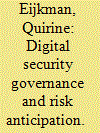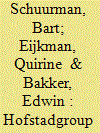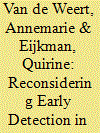|
|
|
Sort Order |
|
|
|
Items / Page
|
|
|
|
|
|
|
| Srl | Item |
| 1 |
ID:
130993


|
|
|
|
|
| Publication |
2014.
|
| Summary/Abstract |
The anticipatory turn in managing security and safety relies not only on innovative technological tools, but also on social practice. New information and communication technology, for instance, facilitates digital security governance1 which entails the collection, processing, storage, and sharing of digital personal data for risk profiling, but little is known about the role of security officials in preemptive security. Although people, or "data subjects," are categorized according to a (predefined) level of potential threat on the basis of digital data, it is often unclear which actor or agency was responsible for this categorization. This is especially unclear when information was shared across the globe between several security agencies and/or private companies. Nonetheless, as the assessment of risk or dangerousness affects someone's real-life opportunities, privacy rights or claims to something or someone are likely to be evoked.
|
|
|
|
|
|
|
|
|
|
|
|
|
|
|
|
| 2 |
ID:
142529


|
|
|
|
|
| Summary/Abstract |
Despite the Dutch Hofstadgroup's status in the literature as a prime example of a homegrown Salafi-Jihadist terrorist network, the authors, using newly available primary sources, argue that this classification is to a large extent unwarranted. The lack of a rudimentary organizational structure, the existence of divergent views on the legitimacy and desirability of political violence, and the absence of collective action in pursuit of a violent goal rule out labeling the Hofstadgroup as a terrorist organization or network for the largest part of its 2002–2005 existence. A smaller subgroup of extremists did begin developing into a proto-terrorist inner circle from late 2003 onwards. In 2004, this extremist core brought forth the murderer of filmmaker Theo van Gogh. But it was only in 2005, when the remnants of the inner circle tried to resuscitate the Hofstadgroup in the wake of the arrests that had followed Van Gogh's death, that these individual actions were replaced by the communal efforts necessary to warrant the “jihadist network” label often ascribed to the Hofstadgroup. Arguably the most archetypical aspect of the Hofstadgroup case is its ability to illustrate the deleterious effects of the ongoing scarcity of primary sources-based research on terrorism.
|
|
|
|
|
|
|
|
|
|
|
|
|
|
|
|
| 3 |
ID:
178926


|
|
|
|
|
| Summary/Abstract |
In recent years, the fight against terrorism and political violence has focused more on anticipating the threats that they pose. Therefore, early detection of ideas by local professionals has become an important part of the preventive approach in countering radicalization. Frontline workers who operate in the arteries of society are encouraged to identify processes toward violent behavior at an early stage. To date, however, little is known about how these professionals take on this screening task at their own discretion. Research from the Netherlands suggests that subjective assessment appears to exist. In this article, we argue that the absence of a clear norm for preliminary judgments affects prejudice or administrative arbitrariness, which may cause side effects due to unjustified profiling.
|
|
|
|
|
|
|
|
|
|
|
|
|
|
|
|
|
|
|
|
|